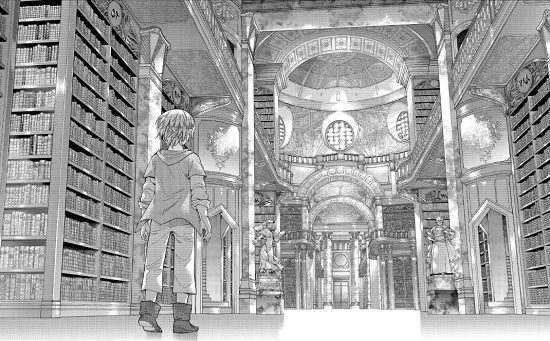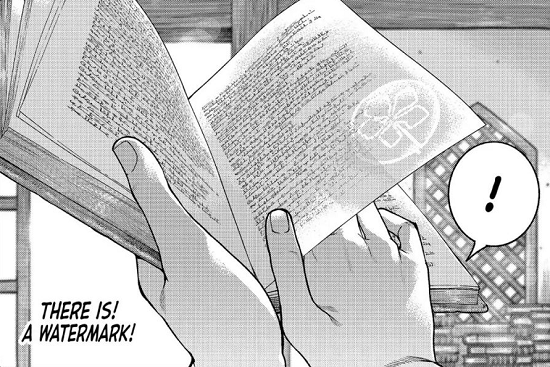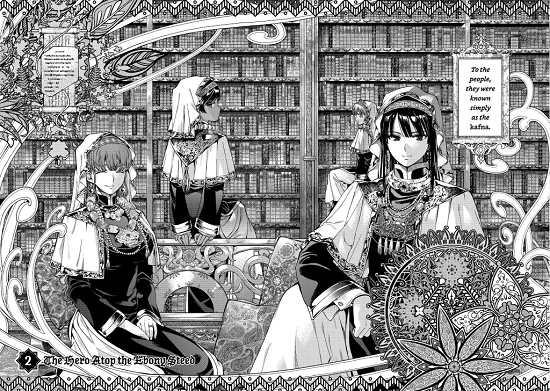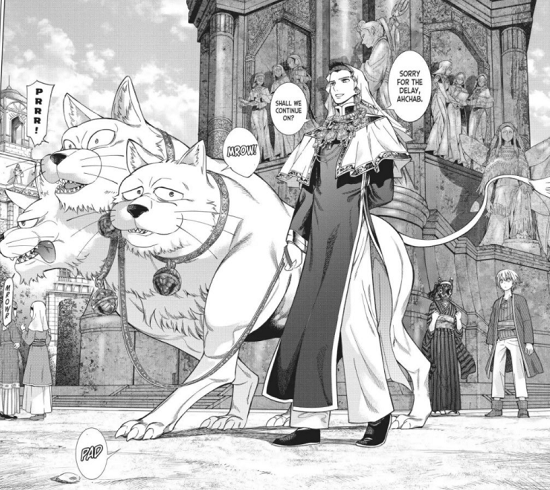
Written by Robert Frazer on 27 Aug 2020
Distributor Kodansha Comics • Author/Artist Mitsu Izumi • Price £10.99
Now, this is certainly novel. The covers of each volume of Magus of the Library have a prominent subscript: “Based on Kafna of the Wind by Sophie Schwimm. Translated by Hiroto Hamada“ they proclaim underneath the title. That piques your curiosity – a English novel, translated into Japanese, adapted into a manga, then re-translated back into English? What a fascinating game of Chinese whispers! It’s like when you run a paragraph through Google Translate ten times consecutively to admire the machine-mangled automatic poetry that emerges out of the other end. It also engages your deeper interest – manga adaptations of English books outside of Holmes, Shakespeare, and whatever else a tourist might pick up on their guided tour of Old London Town are comparatively rare, so if this Kafna of the Wind was prominent enough to break out into foreign audiences halfway across the world, it must have been quite remarkable indeed and this manga is more likely than most to be a good one and worth a purchase.
If you look for the original source material though, that’s where you’ll hit your first snag. Go through the library catalogues, search Amazon high and wide, you won’t be able to loan out or buy a copy of Kafna of the Wind anywhere. Wow, that’s even better – it’s a rediscovered treasure of a rare book that’s been long out of print! That makes the manga even more special, it’s not just a comic it’s a literary rescue mission!
It’s a lovely tale to tell, but as tales go it’s a tall one. You won’t find Kafna of the Wind in any library for simple and more prosaic reason that Kafna of the Wind does not actually exist… the attribution is fake. Sophie Schwimm, Hiroto Hamada, and their book are all completely fictional!
Why reference a non-existent book? A cynic might dismiss it as a marketing ploy: by pretending it’s an adaptation the book is made to seem more important and influential than it actually is, for the reasons given above. If that’s the case then I honestly don’t feel outraged and I really don’t mind it that much – I can respect their cunning. Really though I doubt that financial motives are involved here – adaptation is a frequent if not fundamental characteristic of the anime and manga industry where anime are often adapted from manga and manga are often adapted from light novels (and vice versa). Given how commonplace adaptation is, few manga readers will be automatically impressed by a title being derived from something else, and Kodansha are a big enough player in the market to know this. It also reads more like the big reveal of the story in the Nintendo DS videogame Hotel Dusk: Room 215 which was based around an art fraud where the value of paintings was inflated by producing fake provenances for them… frankly that already seemed a bit contrived and unrealistic in the game, so it’s also needlessly convoluted to invent a plot around selling a weeaboo comic book!
There’s also the fact that the dedication to keeping kayfabe over the fictional source material continues on into the manga interiors, which would have been unnecessary if it was all just advertising – each of these three volumes also begins with a fake epigraph, the first another bon mot of the legendary Sophie Schwimm herself. Rather, these fictional attributions are better respected as having a characterful, thematic role which is actually quite intriguing. Magus of the Library is a manga about how reading is inspirational, and so the myth that this manga was born out of another story also reflects how the ardent love of books and the tales they tell also drive the hero of this story to embark on his own magnificent adventure. When recounting his escapades, have Kodansha bound a classic to add to the literary canon or just churned out some pulpy penny dreadful?

Magus of the Library is set in a peaceful fantasy realm where the printing press has unlocked the world and reading has become extremely fashionable. Even the richest man can’t call himself wealthy and lacks prestige unless he has a straining bookcase laden with historic first editions with which to impress his dinner guests, and even the meanest, most impoverished villages out in the furthest edges of the sticks still have the civic pride to found public libraries and become part of greater civilisation. One young boy who sadly is not able to partake in this new era of culture and learning though is Theo Fumis. Theo adores books and loves reading more than anything else in the world, but is never able to live his passion because he is ostracised for being a half-elf, bullied by the other children for his albino skin and resented by the adults as a half-caste mongrel – whenever he’s caught sneaking into the library to leaf through the new deliveries he’s invariably dragged out by his pointy ears.
Theo has to live with the destitute in the town’s slum, supported by his adoptive and unfailingly loyal human sister, but for all his privations he maintains a sunny disposition and has dreams bigger than his prospects. He yearns to visit Aftzaak, not only the great city at the centre of the continent and the melting pot crossroads of every country in the land, but also home of the fabled Central Library – a massive institution which preserves copies of every single book that’s ever been written. Aftzaak is a very long way away though… but it becomes a lot closer to Theo on the day the kafna ride into town.
“Kafna” are agents of the Central Library – they travel all over the world upholding literacy, registering copyrights, collecting new editions and maintaining local library standards and access. However, kafna are far more than just bureaucratic box-ticking bores: members of a sacred order founded long ago in the aftermath of the old wars to preserve and rebuild shattered knowledge, kafna are also fearsomely powerful sorceresses – they need such spells, because books can be dangerous as well as inspirational. There are still very many magical grimoires from the old days which remain unaccounted for, bleeding violent energy which can’t be contained by their fraying bindings, and in his poking around the local library Theo might just have inadvertently uncovered one such lost and terrible tome…
It sounds odd but despite Magus of the Library being a manga devoted to exalting the written word, what stands out most about it is the artwork. Mangaka Mitsu Izumi’s art in her previous manga 7th Garden was good but nor memorable, but she’s been saving her energies and pulled out the stops here because Magus of the Library is absolutely gorgeous. While some scenes of more palatial architecture around Aftzaak and the Central Library in the back half of Volume Two look a bit too precise and fairly obviously computer-assisted, they are still detailed and everything else is filled out with real clarity and effort. The setting’s aesthetic calls on the Near- and Middle-Eastern milieu, and from the unstinting detail of photorealistic drawn backgrounds, elaborately-patterned clothes, gold stitching in the hems of the kafna’s habits and the heavy jewllery around their necks, and careful carving and detailed fretwork in furniture, Mitsu is quite honestly giving Kaoru Mori, creator of A Bride’s Story and considered one of the most authentic mangaka in the business, a real run for her money!
Another point of contrast with Kaoru Mori is the lack of fanservice in Magus of the Library. For all Mori’s reputation for unstinting realism in her historical manga, she’s always been a bit impish and cheeky and never held herself above stirring in a dollop of sauciness with a bath scene or three. Izumi however is a lot more conservative – everyone remains completely bundled up all the way through to volume 3 when a midriff-baring hip-swaying catgirl sashays in for a couple of chapters of comic relief. That said, while Magus of the Library is not racy I wouldn’t necessarily call it frumpy either – Mitsu does still know to have fun around her limitations, such as one girl in volume two who triple-checks every item in her wardrobe for making a good impression only to be undone when she forgets to take the price tag off her headscarf, or another girl in volume 3 who is also swaddled up except for her blindingly brilliant reflective forehead!

In a manga about books though Mitsu can’t be criticised for the dedication she shows to the books themselves. As manga enthusiasts, we read a pulpy medium and we’re used to flicking through simple, “perfect bound” paperbacks – square off the pages, dob on some glue, job done. Mitsu however is fascinated by the expansive depths to the art and craft of book-binding and each of these three volumes has a long segment dedicated to the construction and maintenance of classic texts, the specialist tools required to repair them, and the intricacy of forensic examination of an unknown book to discover the secrets hidden within its spine and stock. As someone who did History & Archaeology at university and has spent some time in the Bodleian these were chapters that I appreciated, and I can happily agree that although Magus of the Library is a fantasy world, Mitsu Izumi has nonetheless done real research.
It is still very much a fantasy world, though – after reading Record of Grancrest War Izumi would probably make a decent tabletop roleplaying Dungeon Mistress herself because there’s an obsessive level of world-building in these books. Chapter interstices have asides explaining geographical landmarks along Theo’s journey, historical notes on the societies he interacts with and commentaries on the key texts of their cultures. The omakes of Volumes One and Two even have glossaries of in-universe jargon, explanations of the rank markings on kafna uniforms right down to the lengths of their wimples and even outright synopses of fictional books! The details generally make sense and the art presents lots of interesting giant fantasy creatures, but while background exposition sounds boring and reminiscent the plodding tedium of Future History that made the opening of Legend of the Galactic Heroes such a slog, while it’s clear this land of imagination is near and dear to Izumi’s heart and she’s desperate to tell us more she exerts discipline over herself and keeps it well-balanced – ancillary world-building detail stays in the margins and it’s not necessary to follow the main thrust of the narrative, so you don’t get interrupted by walls of irrelevant text.
What you do get interrupted is walls of moralising instead. The prejudice Theo suffers for being an “Amity Child” (which I have to admit is actually quite a clever euphemism for mixed-race) at the start of the book is an early indication, but similar topics are painfully dragged out across all three of these books – Magus of the Library is excruciatingly right-on. There are repeated digressions where the manga directly cants at you about the importance of dialogue between cultures, to the extent it interrupts the drama (one kafna takes time out from battling a grimoire to lecture the librarian on equal access rights). And yes, I agree, racism’s a bad and terrible thing but it batters you over the head with it again and again and again, most egregiously a whole tranche of volume two which swerves off the plot completely and has zero relevance to the wider story (seriously, you could skip the chapter and not miss a beat) where Theo takes fifty pages to finger-wag at a young girl that she shouldn’t be mean to the “slant-eyed savages”. This is all very well and good but is fantasy really the right venue for it? The real-world issues of unfairness of skin colour don’t really work in a world of dungeons and dragons where there are measurable, vivid differences between immortal elves and cold-blooded lizardmen. The late Sir Terry Pratchett advocated liberal ethics in his Discworld books but even he didn’t try to make the six foot-tall Captain Carrot live in a three foot-high dwarvish mine no matter how discriminatory it was.
It's also not justified from Theo's perspective as he quite simply does not merit the privilege of victimhood - while he suffers from some moderate childhood bullying for being a knife-ear he also has plenty of friends and allies in his home village even in the initial chapters and he also is revealed to have super-special magical protagonist powers, so I'm not admiring a poor boy's sociopolitical struggle against prejudice, I'm rolling my eyes at the clichéd hero of a rote Magical High School light novel, with the sort of narrative cakeism of being simultaneous underdog and power fantasy where the protagonist is technically low-ranked but only because he's so incredibly powerful he's off the scale and doesn't register on the charts. All in all, I feel acutely patronised by Magus of the Library’s entirely unearned The-More-You-Know, Very-Special-Episode children’s television PSA preachiness. Even the allure of the sexy half-naked belly-dancing nekomimi is killed stone dead when it only serves as yet another tediously worthy lecture on multiculturalism – the other people in the library are scandalised and demand she cover up whereas Theo piously harrumphs to leave her be as she’s dressed appropriately by the standards of her people. How progressive of him.

This proves to be another persistent problem… Theo is the protagonist, but he’s also a total, utter, hopeless dweeb. Entirely apart from his extravagant unwarranted priggishness, he’s a maniacally obsessive cultist when it comes to books. This is funny at first (one early scene where he's so reverent about the book in his hand he catches his teardrops from falling on a page is amazing for its earnest intensity) but it goes past comical and just becomes wearing. Yes, books open up whole new planes of understanding and truth… but no matter how bookish you consider yourself to be, after you’ve suffered through Theo’s umpteenth sententious homily on the Magic Of ReadingTM you’ll want to give the nerdy swot a wedgie and steal his lunch money.
Pacing is also way off. These manga volumes are very thick and dense reads - £10.99 is more expensive than a typical manga volume but the size of the books still makes them good value. There is an explosive action sequence where the kafna seal away a rogue grimoire in volume one but then the issue of magical books is dropped and never comes up again until the second half of volume three, by which time you’ve almost forgotten that it was even a thing. There was also a detail about the journey to become a kafna that I actively disliked, and coming from a mangaka so clearly devoted to comprehensive consistent worldbuilding it was surprisingly illogical. The kafna entrance exam is a gruelling affair – the written part alone takes days to complete – and at the end examinees are subjected to a sort of curatorial Kobayashi Maru when they’re assigned a book-identifying task which is impossible to complete because seeing how they react to being told they’ve failed is part of the test. Candidates don’t get sent their actual results until months later. The narrative reason for this is so there can be a denouement chapter where the wiser Theo heads home and sees how he’s grown and positively influenced all those around him and lives magnanimously before he gets the calling to his kafna vocation, but there are unfortunate implications. Kafna are presented as wise sages but this was stupid - apart from the heartlessness of the test, the delay makes it useless too. What about the other girl who was trying to become a kafna to avoid having to get married? As it happened she washed-out at an earlier stage so it may be a moot point, but what if she had got this far, went home in apparent defeat, and then got the letter inviting her back to Aftzaak by the time she was already wedded off and pregnant? Poor girl…
That sounds like a bum note to finish up on but these three volumes are a long introductory trilogy – there is promise that a proper plot is starting to kick into gear as we head into volume four so some of these previous volumes’ limitations can start to be left behind. While Magus of the Library bores you rigid with its sanctimonious nature at times, it remains a beautifully-drawn artistic endeavour created with real drive, enthusiasm, commitment and imagination, and that’s still a worthwhile lesson to take to heart.

Robert's life is one regularly on the move, but be it up hill or down dale giant robots and cute girls are a constant comfort - limited only by how many manga you can stuff into a bursting rucksack.
posted by Eoghan O'Connell on 25 Nov 2025
posted by Ross Locksley on 06 Nov 2025
posted by Eoghan O'Connell on 05 Nov 2025
posted by Ross Locksley on 21 Oct 2025
posted by Eoghan O'Connell on 18 Oct 2025
posted by Ross Locksley on 26 Sep 2025
posted by Eoghan O'Connell on 23 Sep 2025
posted by Ross Locksley on 16 Sep 2025